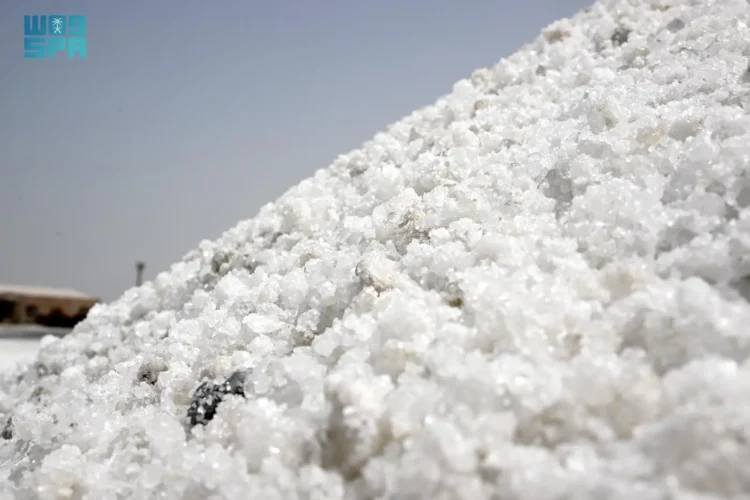Publisher: Maaal International Media Company
License: 465734
Saudi Salt: “White Gold” Supports Industries and Boosts Exports by SAR 3.7 Billion
The salt industry has emerged as a promising sector within the national mining system. This sector is receiving increasing attention from the Ministry of Industry and Mineral Resources, which has launched various investment opportunities, including licenses for geological exploration and factory operation, with the aim of developing the “white gold” industry and strengthening its presence locally and internationally. This comes in light of the Kingdom’s drive to develop industrial sectors and maximize the use of its natural resources.
By mid-2025, 27 national facilities specializing in the production of “white gold” salt have contributed to supplying local and global markets with products valued at approximately SAR 3.7 billion. Saudi salt used in the food industry was exported to Jordan, the UAE, Bahrain, Sudan, Somalia, Kuwait, Yemen, Greece, Djibouti, the Sultanate of Oman, Qatar, Libya, Malaysia, Mauritania, and Indonesia, with total exports exceeding 18 million riyals during the period from 2024 to mid-2025. (SPA)
The most important natural salt reserves are concentrated in the salt marshes located along the Arabian Gulf coast in the Eastern Province, extending over 1,200 kilometers, from the north of Khafji Governorate to the port of Uqair in Al-Ahsa Governorate. The Ras Al-Qarya salt marsh in Buqayq Governorate is one of the oldest and most prominent production sites, located approximately 4 kilometers from the sea and distinguished by the production of highly purified natural salt that floats on the surface of the earth and extends to a depth of 5 meters below the surface. Large quantities of sea salt are extracted during the summer through the evaporation of rainwater and seawater from salt marshes by the sun. Salt is also extracted from rocks rich in sodium chloride, such as halite, as well as from natural mines and salt ponds.
اقرأ المزيد
This industry is a strategic pillar supporting numerous manufacturing and petrochemical industries, in addition to the production of high-purity table salt, which is used in the food industry. The raw salt extracted from the Ras Al-Qarya salt marsh is converted into industrial salt with a purity of over 99% sodium chloride.
For his part, Fahad Al-Qahtani, General Manager of Misfer Mining and Logistics, emphasized that the Kingdom is rich in natural resources and possesses a large strategic reserve in the mining sector, including the salt industry, which is a promising sector for supporting the national economy, especially in light of the Kingdom’s Vision 2030, which has made mining a strategic priority. Al-Qahtani pointed out that the Ras Al-Qarya sabkha is one of the oldest salt-rich sites in the Kingdom. Its geographical location overlooking the Arabian Gulf has facilitated the formation of sea and rock salt over thousands of years. This was a result of seawater seeping into the low-lying sandy sabkhas, which then evaporated due to the sun’s heat. The sediments were then recollected, purified, and washed, before being refined according to the desired use.
In the same context, Engineer Ahmed Al-Awad, a mining specialist, explained that salt types in the Kingdom are divided into two main types: rock salt, which is highly purified and abundantly produced and used in industrial and food applications, and salt produced by evaporating groundwater, which is characterized by lower quality but in smaller quantities.
He added that the selection of salt mine sites, particularly in the Eastern Province, is subject to accurate geological surveys to estimate the size of the reserve. He noted that some areas of the Ras Al-Qarya sabkha contain reserves exceeding 5 million tons of renewable raw salt. He also reviewed the extraction method, which involves digging trenches up to 4 meters deep, while adhering to environmental standards and the protection of natural resources.a








